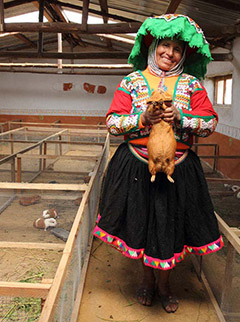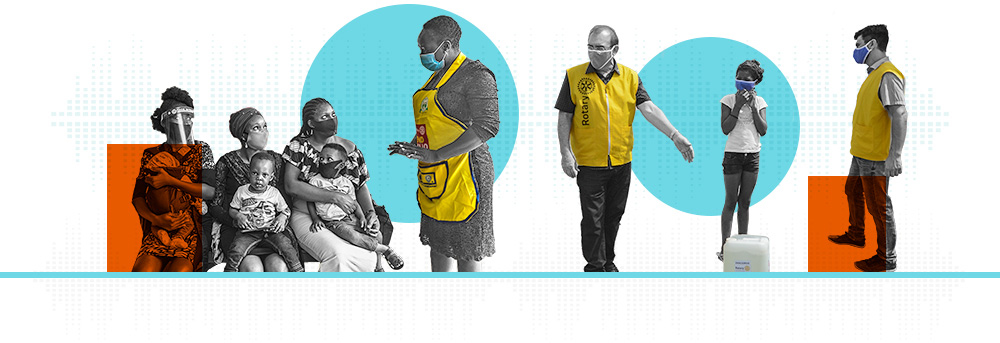
Villagers increased their income by learning more efficient ways to raise guinea pigs and other livestock. Photo courtesy of Willem van Immerzeel
By Willem van Immerzeel, a member of the Rotary Club of Inka Cusco, Cusco, Peru
Cusco, Peru, where I live, is a touristy place. Most visitors get only a glimpse of the poverty that exists in rural areas in my country. But poverty is a very real side of Peruvian society, deeply impacting the lives of the millions engulfed in it. Widespread poverty has a destabilizing effect on society and goes a long way in explaining the extreme violence that dominated life in Peru for decades.
Since I was young, I considered it my duty to contribute to end poverty. In the early 1980s, I worked as a volunteer in Guinea Bissau, Africa, and later in Cusco. I soon discovered that projects can provide relief for some, but eradicating poverty for many requires much more. No project can do what people are capable of doing themselves, if they are empowered, given the opportunity to learn how to improve their conditions, and mobilized to apply what they have learned.
Soon after arriving in Peru in 1985, I developed a simple but effective methodology to empower families. The first step is finding a few families who already have made great strides to pull themselves out of poverty. These families become examples for others to follow and even improve upon what they have done.
At first, finding these model families can be very hard. Organizing contest between hundreds of families on a variety of issues including health and income provided a systematic way to identify great examples for others to follow. I call these model families “expert farmers.” The methodology is called “Pachamama Raymi” (Fiesta of Mother Earth in Quechua). It has a festive spirit: contests between families, and families helping each other.
And that’s just what our Rotary projects in the District of Ccarhuayo did. We worked with 484 families in Ccarhuayo, the poorest district in the Cusco region, and the fifth poorest district in all of Peru. I organized a very intensive exchange between the families of Ccarhuayo and the experts. The Ccarhuayo families took part in study tours to learn from the model families, and expert farmers visited the Ccarhuayo families to lend their expertise.
The speed of change and the results were staggering. More than 80 percent of the families in Ccarhuayo participated and adopted innovations within three years. The families embraced better preventative health measures by improving their diet, visiting local health services, and taking other steps to improve sanitation and hygiene such as using a bathroom. The families increased their incomes by improving their methods of raising alpacas, guinea pigs, and trout. And they planted an average of 1,000 trees in 2012 and twice that in 2013, helping prevent the effects of deforestation and soil erosion.
By using the Pachamama Raymi methodology, we have impacted the lives of over 40,000 people in the poorest districts of Peru. Pachamama Raymi has successfully been used in other countries too, using the people’s own knowledge and means to eradicate poverty.

when and where do your club meet in Cusco. We would love to come for the meeting
I Asrar Ahmed and wife Amina are traveling from Feb 23rd to March 1st 2020.
LikeLike
Good morning!
I am a Rotarian form Minneapolis Minnesota USA and I am coming to your wonderful country from November 11-24. I would love to visit your club and meet some Cusco Rotaarians. Unfortunately I do not speak Spanish–does anyone in your club speak English? I can be reached at suzanne@en-visioneering.com.
Thank you.
Suzanne Kochevar
LikeLike
Hi Willhem. I truly enjoyed this article. I will actually be in Cusco between July 12th and August 15th. Is the club still actively meeting? I would love to participate in a meeting and see what Rotary is doing in Cusco. My e-mail is emccoy@pucp.pe. Thank you!
LikeLike
I am also planing a visit and am trying to make contact with any Rotary Club in Cusco. Is your club actively meeting? Thanks – revjcn@gmail.org.
LikeLike
William
,I will be in Cusco later this month. When does your club meet? I will be coming from Salem Oregon. I can be reached at tmurphy586@gmail.com
LikeLike
Peru is close to my heart, too. I admire what you have done. It’s always important to use the processes familiar to the locals. Wonderful work!
LikeLike
Pingback: Today’s Links | Rotary International District 3040
This is the only way to be successful with a project of this magnitude.Introducing former poor to those less fortunate,shows them it can be done.Unless one has a personal incentive to benefit ,teach others and reap the rewards themselves programs like this are mere pie in the sky.Keep the government out of it altogether..Best of luck to all involved.
LikeLike
This reminds me lot of the agricultural shows and field days that have encouraged improvement between farmers in Australia for a couple of hundred years (and most likely England before that). In fact, my brother is participating in a competition with 6 other farmers right now. http://www.mla.com.au/Livestock-production/MLA-challenge/Marcus-Sounness. In developing societies, it can be used to tackle extreme poverty and in developed societies to improve sustainability. Great work!
LikeLike
Pingback: Empowering families to end poverty in Peru | Warsaw Rotary , Club 3393, District 6540